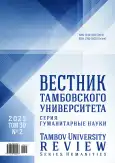The idea of law abolition in the Soviet judicial system in 1917–1922
- Authors: Fedoseenkov N.N.1
-
Affiliations:
- The Russian Academy of Arts
- Issue: Vol 30, No 2 (2025)
- Pages: 493-502
- Section: NATIONAL HISTORY
- URL: https://bakhtiniada.ru/1810-0201/article/view/298966
- DOI: https://doi.org/10.20310/1810-0201-2025-30-2-493-502
- ID: 298966
Cite item
Full Text
Abstract
Importance. The idea of law abolition in the legal and political disputes of the first postrevolutionary years is considered. The discussion related to this issue determined the postrevolutionary ideology in our country and had a serious impact on the theory of state and law, as well as on the formation of Soviet judicial authorities. In addition to the Marxist roots of this concept, the Russian tradition is considered, not only the Marxist one. The problem is raised as to how seriously the ideologists of 1917–1922 took the idea of “law abolition” and the priority of “revolutionary expediency” or saw the former as a distant prospect. This issue affects different aspects and sides of historical science.Materials and Methods. The research is conducted on original archival and open sources basis. The methodological basis of the research is the principles of objectivity and historicism, which consider historical processes in development and interrelationships. Retrospective and comparative methods of historical research are also used.Results and Discussion. The study analyzes various aspects and trends of official Soviet jurisprudence of the revolutionary and first post-revolutionary years, the bearers of which were P.I. Stuchka, D.I. Kursky, N.V. Krylenko, A.G. Goikhbarg, and others, as well as their ideological predecessors. It shows a long-standing tradition associated not only with the revolutionary movement, in which we see elements of “legal nihilism”. The essence of the most acute discussions in this context is revealed. The reasons for the curtailment of the “law abolition” idea after the end of the Civil War and the role of V.I. Lenin in this process are shown. Alternative ways of development of legal bodies in the RSFSR during the Civil War and after it, during the reform of 1922, are considered.Conclusion. The ideology that prevailed in relation to law in 1917–1922 cannot be perceived in isolation from the history of Russian and world thought. The evolution of attitudes towards justice after the Civil War (including the gradual overcoming of legal nihilism) led to the restoration and strengthening of elements of stable law and a centralized State.
About the authors
N. N. Fedoseenkov
The Russian Academy of Arts
Author for correspondence.
Email: shezgar@yandex.ru
ORCID iD: 0009-0004-2101-7247
corresponding member
21 Prechistenka St., Moscow, 119034, Russian FederationReferences
- Fedoseenkov N.N. (2024). The people’s commissariat of justice and the development of Soviet legislation: from the revolutionary struggle to legality. Rossiiskaya istoriya = Russian History, no. 5, pp. 119-126. (In Russ.) https://doi.org/10.31857/S2949124X24050078, https://elibrary.ru/skvzjk
- Gavrilova I.N. (2017). Problems of contemporary assessment of revolutionary legal and political transformation in the Soviet state. Gosudarstvo i pravo = State and Law, no. 12, pp. 29-30. (In Russ.) https://elibrary.ru/zvkzfn
- Aksenov V.B. (2017). Revolution and violence in contemporaries'' imagination: rumors and emotions of the “Honeymoon” of 1917. Rossiiskaya istoriya = Russian History, no. 2, pp. 17-32. (In Russ.) https://elibrary.ru/yocvot
- Zemtsov B.N. (2017). The “legal nihilism” of the Bolsheviks. Leningradskii yuridicheskii zhurnal = Leningrad Legal Journal, no. 4, pp. 23-34. (In Russ.) https://elibrary.ru/ynmjcy
- Khramtsov A.B. (2024). The transformation of the Tsarist police into a people’s militia in Tobolsk province (March – April 1917). Novyi istoricheskii vestnik = The New Historical Bulletin, no. 3 (81), pp. 72-91. (In Russ.) https://elibrary.ru/zxjpeo
- Solomon P. (2008). Soviet Justice under Stalin. Moscow, 464 p. (In Russ.)
- Bol’shakova O.V. (2016). Law and order in pre-revolutionary Russia: recent American studies. Rossiiskaya isto-riya = Russian History, no. 6, pp. 145-157. (In Russ.) https://elibrary.ru/xsangt
- Solov’ev K.A. (2019). Autocracy and the Constitution: Everyday Politics in 1906–1917. Moscow. (In Russ.) https://elibrary.ru/xscubw
- Kozlikhin I.Yu. (2014). Leo Tolstoy as a mirror of the Russian legal conscience. Vestnik Sankt-Peterburgskogo universiteta. Pravo = Vestnik of Saint Petersburg University. Law, no. 4, pp. 5-14. (In Russ.) https://elibrary.ru/szbyyh
- Rybakov V.A. (2023). RSFSR people’s commissariat for justice and its activity on the courts management (1941-1945). Rossiiskaya istoriya = Russian History, no. 3, pp. 51-61. (In Russ.) https://doi.org/10.31857/S2949124X23030069, https://elibrary.ru/epxcdt
- Fedoseenkov N.N. (2023). The Formation of the Soviet Legal System. Ideology and Practice. Moscow, 191 p. (In Russ.)
- Kryzhan A.V. (2014). Red tape and malpractices in the local Soviet institutions of justice (late 1920s – early 1930s). Novyi istoricheskii vestnik = The New Historical Bulletin, no. 4 (42), pp. 49-62. (In Russ.) https://elibrary.ru/texgur
- Nikonovich S.L. (2020). On the laws of state and law development in Soviet Russia (for example of the prosecu-tor's office) V.N. Galuzo. Institute of power of the prosecutor's office in Soviet Russia (1917–1991). Part III. Oblivion of law. Gosudarstvo i pravo = State and Law, no. 10, pp. 160-163. (In Russ.) https://doi.org/10.31857/S102694520012243-8, https://elibrary.ru/ejldrv
- Petrov Yu.A. (2017). Russia on the eve of the Great revolution of 1917: recent trends in historiography. Ros-siiskaya istoriya = Russian History, no. 2, pp. 3-16. (In Russ.) https://elibrary.ru/yocvoj
Supplementary files








